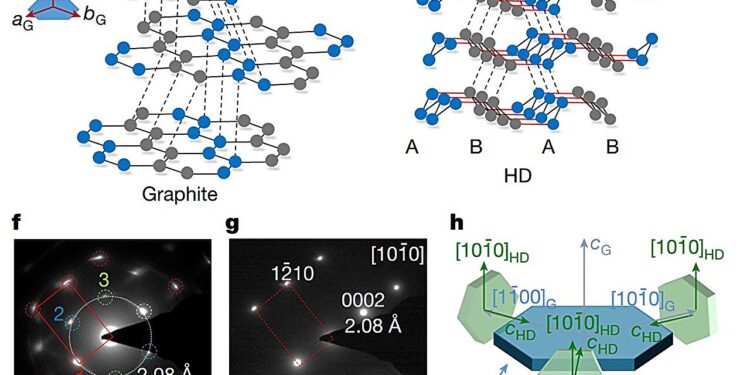The researchers successfully synthesized and recovered the hexagonal diamond in bulk, with crystal sizes of 100 µm to millimeters.credit: Nature (2025). DOI: 10.1038 / S41586-025-09343-X
The brilliantly shiny diamond is more than pretty; It is one of the hardest minerals of the earth, with a name derived from the Greek word Adámas, which means unbreakable. Scientists have now designed a harder diamond form known as the hexagonal bulk diamond (HD) – a crystal structure that has been theorized for more than half a century to have physical properties greater than those of conventional diamonds.
In a study published in NatureChina researchers synthesized the hexagonal diamond in bulk, ranging from 100 µm to the size of a mm, with a highly ordered structure by compressing and heating high -quality graphite monocrystals in pressure conditions as uniform as possible.
The material designed, which was recoverable in ambient conditions, unveiled the previously elusive structural world of HD, opening new avenues to explore its potential as a technologically higher material.
In addition to being a dazzling element in jewelry, diamonds, because of their unrivaled chemical and physical properties, are sought in a wide range of applications, including biocapters, quantum computers and industrial processes as a superabrasives and drilling bits.
These properties come from its unique cubic atomic structure, where each carbon atom is linked to four other carbon atoms via SPR3 Obligations, giving rise to a rigid tetrahedral network.
These structures then form stucks in honeycomb that hide one on each other to build cubic diamond crystals. The natural cleavage plans created by these layers in layers are also the reason for the Diamond force limit, which suggests that research can be rectified by strengthening and selectively shortening intercouching links. This change, however, would transform the cube diamond into hexagonal crystalline symmetry.
The Hrtem images and the corresponding TAD models of the HD sample in bulk were acquired along different area axes. Credit: Nature (2025). DOI: 10.1038 / S41586-025-09343-X
Similar transformations are not invisible in nature, for example, HD, also known as Lonsdaleite, is in the Diablo Meteorite canyon, where it was appointed.
A 2022 study suggested that high temperatures and shock compressions created during the impact of meteors transform graphite into the meteorite in HD.
Scientists have attempted to imitate similar explosive and high pressure conditions in laboratories to produce artificial lonsdaleite, but most samples are too small and often unclean, which makes it difficult to isolate and study the real properties of HD.
Now, the researchers have successfully synthesized a highly ordered and almost pure loose HD, which has been recovered intact in ambient conditions. From the hexagonal monocrystalline graphite, they created a controlled quasi-hydrostatic environment-applying the pressure as uniformly as possible to minimize constraint variations, using both a diamond anvil cell (DAC) and a large volume multi-volume press.
The bulk sample consisted of a triple intercroquering of densely wrapped crystals, each of 100 nanometers of approximately 100 nanometers, mainly composed of HD with minor imperfections, including traces of cubic diamond.
SP3 Pure SP3 link and excellent mechanical properties of bulk HD. Credit: Nature (2025). DOI: 10.1038 / S41586-025-09343-X
The study of molecular level mechanisms via spectroscopy revealed a complete conversion of SP2 links in sp3 Links, indicating a direct crystallographic transformation of diamond graphite.
They also found that intercounted HD links were stronger and shorter than those of the conventional cubic diamond, which was reflected in the Vickers hardness test – which measures the resistance of a material to plastic deformation – where HD values were slightly higher.
The researchers note that this study unambiguously demonstrates the existence of HD as a phase of good faith of carbon with a higher hardness, similar to that of the Cubic diamond. They believe that the experimentation of levels of purification of the graphite pioneer and the fine adjustment of pressure-time conditions can lead to the creation of an even higher HD with higher properties.
Written for you by our author Sanjukta Mondal, edited by Sadie Harley, and verified and revised by Robert Egan – This article is the result of meticulous human work. We are counting on readers like you to keep independent scientific journalism alive. If this report matters to you, please consider a donation (especially monthly). You will get a without advertising count as a thank you.
More information:
LIXIANG Yang et al, synthesis of the hexagonal diamond in bulk, Nature (2025). DOI: 10.1038 / S41586-025-09343-X
© 2025 Science X Network
Quote: Scientists design Superdiamers with a hexagonal crystalline structure predicted theoretically (2025, August 4) recovered on August 5, 2025 from
This document is subject to copyright. In addition to any fair program for private or research purposes, no part can be reproduced without written authorization. The content is provided only for information purposes.



